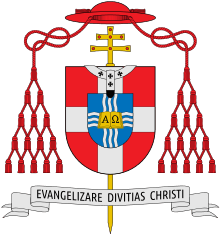Bernardus Johannes Alfrink
| His Eminence Bernardus Johannes Alfrink | |
|---|---|
|
Cardinal, Archbishop of Utrecht Primate of the Netherlands | |
|
Photo: Archepiscopal Archives Utrecht | |
| Archdiocese | Utrecht |
| Installed | 31 October 1955 |
| Term ended | 6 December 1975 |
| Predecessor | Johannes de Jong |
| Successor | Johannes Willebrands |
| Orders | |
| Ordination | 15 August 1924 |
| Consecration | 17 July 1951 |
| Created Cardinal | 28 March 1960 |
| Rank | Cardinal Priest |
| Personal details | |
| Born |
5 July 1900 Nijkerk, Netherlands |
| Died |
16 December 1987 Nieuwegein, Netherlands |
| Buried | St. Catherine's Cathedral, Utrecht, Netherlands |
| Nationality | Dutch |
| Denomination | Roman Catholic |
| Motto | EVANGELIZARE DIVITIAS CHRISTI |
Bernardus Johannes Alfrink (5 July 1900, Nijkerk, Gelderland – Nieuwegein Utrecht 16 December 1987) was a Dutch Cardinal of the Roman Catholic Church. He served as Archbishop of Utrecht from 1955 to 1975, and was elevated to the cardinalate in 1960.[1]
Biography

Bernardus Alfrink was born in Nijkerk, and received his first Communion in 1911. After attending at the seminary in Rijsenburg and the Pontifical Biblical Institute in Rome, he was ordained to the priesthood on 15 August 1924 by Archbishop Henricus van de Wetering. He then completed his studies at the École Biblique in Jerusalem in 1930, and did pastoral work in Utrecht until 1933. Alfrink taught at the Seminary of Rijsenburg (1933–1945) and later the Catholic University of Nijmegen (1945–1951).
On 28 May 1951 he was appointed Coadjutor Archbishop of Utrecht and Titular Archbishop of Tyana. Alfrink received his episcopal consecration on the following 17 July from Archbishop Paolo Giobbe, papal internuncio in The Hague, with Bishops Willem Lemmens and Jan Smit serving as co-consecrators, in St. Catherine's Cathedral.
Alfrink succeeded Cardinal Johannes de Jong as Archbishop of Utrecht on 31 October 1955 and was named Apostolic vicar of the Catholic Military vicariate of the Netherlands on 16 April 1957. He contributed to scientific publications, led the Pax Christi movement in the Netherlands,[2] and was created Cardinal-Priest of San Gioacchino ai Prati di Castello by Pope John XXIII in the consistory of 28 March 1960.
From 1962 to 1965, the Dutch primate participated at the Second Vatican Council, and sat on its Board of Presidency. During one session of the Council, Alfrink had Cardinal Alfredo Ottaviani's microphone turned off after the latter exceeded his time limit.[3]
Alfrink was one of the cardinal electors in the 1963 papal conclave, which selected Pope Paul VI. Along with Cardinal Giovanni Colombo, he assisted Cardinal Achille Liénart in delivering one of the closing messages of the Council on 8 December 1965.[4]
He also served as President of the Episcopal Conference of the Netherlands. Resigning as Utrecht's archbishop on 6 December 1975, he later voted in the conclaves of August and October 1978, which selected Popes John Paul I and John Paul II respectively.
He died in Nieuwegein at age 87, and after his funeral services in St. Catharine's Cathedral, was buried at St. Barbara's cemetery, next to his predecessor.
Views
Aggiornamento
Viewed as a liberal,[5][6] he once said, "It is always a good thing for the Church to move forward. It is not good if the Church comes to a standstill."[7]
Confession
While coadjutor, he announced that the Dominican chapel in Huissen, where a large amount of Catholics were going to confession instead of at the local parishes, would be closed to the public, resulting in the dismay and violent reaction of many.[8]
Edward Schillebeeckx
Alfrink supported Fr. Edward Schillebeeckx, OP, and took his condemnation as an offence to the Dutch Church.[9]
Humanae Vitae
During his tenure, Alfrink and his fellow Dutch clergymen attacked the argumentation used in Pope Paul's 1968 encyclical Humanae Vitae.[10]
Royal conversion
He refused to respond to the Dutch Reformed Church's call for clarification in regards to Princess Irene's conversion to Catholicism.[11]
Awards and Honors
In 1986 he received the Four Freedom Award for the Freedom of Worship[12]
Trivia
His father's name was Theodorus, and the priest who baptized him was Johannes Verstege.
References
| Wikimedia Commons has media related to Bernardus Alfrink. |
- ↑ "Alfrink, Bernard Jan Cardinal". Who Was Who in America, 1993–1996, vol. 11. New Providence, N.J.: Marquis Who's Who. 1996. p. 4. ISBN 0837902258.
- ↑ "Seven New Hats". Time.com. 14 March 1960.
- ↑ "What Went Wrong With Vatican II". Ewtn.com.
- ↑ "To Rulers". Christusrex.org.
- ↑ "The Council's Prospects". Time.com. 14 September 1962.
- ↑ "Council of Renewal". Time.com. 5 October 1962.
- ↑ "The Radical, Revolutionary Church of The Netherlands". Time.com. 31 March 1967.
- ↑ "The Dominicans' Door". Time.com. 21 January 1952.
- ↑ "Theologian on Trial". Time.com. 4 October 1968.
- ↑ "Declaration of Independence". Time.com. 17 January 1969.
- ↑ "Love with the Proper Stranger". Time.com. 21 February 1964.
- ↑ http://www.rooseveltinstitute.org/four-freedoms-awards
External links
| Catholic Church titles | ||
|---|---|---|
| Preceded by Pietro Doimo Munzani |
Titular Archbishop of Tyana 28 May 1951 – 31 October 1955 |
Succeeded by Primo Principi |
| Preceded by Johannes de Jong |
Archbishop of Utrecht 31 October 1955 – 6 December 1975 |
Succeeded by Johannes Willebrands |
| New title | Apostolic vicar of the Military vicariate of the Netherlands 1957–1975 | |
| New title | Cardinal Priest of San Gioacchino ai Prati di Castello 28 March 1960 – 17 December 1987 |
Succeeded by Michele Giordano |
| Preceded by Maurice Feltin |
International President of Pax Christi 1965—1978 |
Succeeded by Luigi Bettazzi |
|